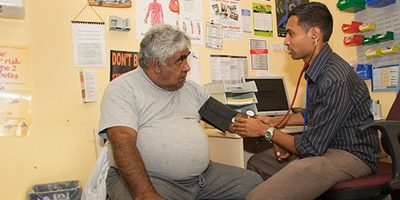
Evaluation of a novel electronic decision support tool for cardiovascular risk management -The TORPEDO study
Cardiovascular disease (CVD) in Australia is a significant burden of disease, and in Aboriginal and Torres Strait Islander people experience around five times greater CVD burden than the rest of the population. In a short doctor consultation, in primary care settings, it is often difficult for healthcare staff to assess and advise patients on the full range of cardiovascular risk. Evidence practice gaps for management and prevention of CVD are large and well documented.
Health service strategies based in primary care are likely to provide the best opportunity to improve the uptake of best practice recommendations and reduce the Australian vascular disease burden. There is good evidence that electronic decisions support systems can improve practitioner performance.
What is the TORPEDO study?
TORPEDO is a cluster-RCT of an Australian primary healthcare quality improvement (QI) intervention seeking to address barriers to improved cardiovascular disease risk management and prevention. The intervention comprises of computerised decision support (HealthTracker-CVD), audit and feedback tools, and clinical workforce training.
Primary objectives
To assess whether health services allocated to receive HealthTracker-CVD, an electronic decision support tool, to assist primary care practitioner in guideline implementation for cardiovascular disease (CVD) risk management will have:
- An increased proportion of patients receiving appropriate and timely measurement of their CVD risk factors
- An increased prescribing of guidelines recommended medications to patients at high risk of CVD
Implementation
TOPREDO was implemented in 40 General Practices and 20 Aboriginal Community Controlled Health Services in NSW and Queensland. The study had a minimum of 12 months follow-up.
Automated data extraction was conducted at baseline and end of study follow-up visit on regularly attending patients defined as patients that have had three visits in the last two years and one visit in the last six months for Aboriginal and Torres Strait Islander people ≥ 35 years, and all others ≥ 45 years.
Randomisation was a 1:1 ratio to receive HealthTracker-CVD or to continue with usual practice, and stratification was by type of practice (mainstream GPs versus ACCHSs), health service size, and participation in existing quality improvement programs.
Intervention health services received the following
- Use of the HealthTracker-CVD system
- Training and support to all healthcare staff
- A quality improvement (QI) component (audit and feedback tools)
Evaluation
Process and economic evaluation are underway to understand the impact of the QI Intervention.











